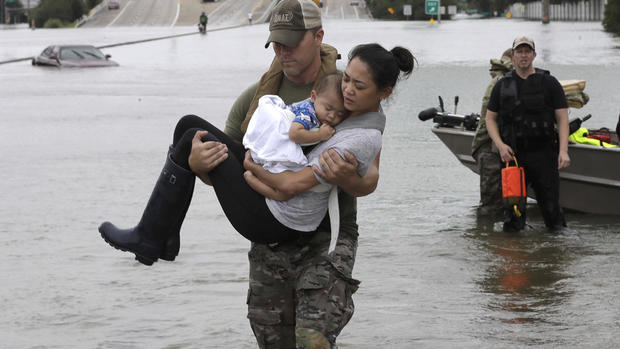After the storm: How to fight your insurance company
If the aftermath of past hurricanes is any indication, many Texas homeowners will have to do battle with their insurance companies when Harvey finally runs out of wind and water.
"Prepare to push for a fair and full insurance settlement," said Amy Bach, executive director of United Policyholders, which represents consumers. "We've seen too many disasters in which residents face a second nightmare after the storm passes and they start dealing with their insurance companies."
A similar message came from Director of Insurance J. Robert Hunter of the Consumer Federation of America (CFA), a former Texas insurance commissioner.
"Because so many consumers experienced severe claims problems in the wake of Hurricane Katrina and Superstorm Sandy, we urge homeowners dealing with losses caused by Hurricane Harvey to be vigilant with their insurance companies, including the insurers settling National Flood Insurance Program (NFIP) claims, to ensure that these homeowners receive a full and fair settlement," Hunter said.
Harvey Flood Insurance
Consumer advocates acknowledge that the major problem is disentangling wind versus water damage: Flood damage isn't covered by regular home insurance policies. Instead, it requires a special flood insurance policy underwritten by the federal government's NFIP program. Only about 5 million homes in the U.S. have flood insurance coverage, and many people in the Houston area didn't think they'd need it because they don't reside in what the federal government deems to be a "flood zone."
Wind -- and water driven onshore by wind, often called "storm surge" -- are generally covered by homeowners' insurance. But Gulf coast residents should check their specific policy for the terms.
"Damage from sewer or drain backup may be covered," according to United Policyholders, and "if wind or falling trees cause damage to pipes or contribute to water getting in, that helps with coverage."
Either way, "History tells us that homeowners may need to fight to get the protection they've paid for," Bach said.
Hunter said insurers have been "steadily increasing hurricane wind coverage deductibles and imposing other … limitations" that shift costs to consumers. The CFA believes that Hurricane Harvey could result in as many as 50,000 claims for wind damage by homeowners, with as many as two or three times that amount in claims for federal flood insurance, depending on how much rain ultimately falls Texas. Insurance payments for wind damage from Hurricane Harvey will likely approach $2 billion dollars, while insured flood claims will likely be in excess of $5 billion, the consumer group estimated.
Hurricane Harvey insurance claims
iHarvey could conceivably rival or even exceed Hurricane Katrina in total flood damage. Flood insurance payouts are expected to be lower because less than 20 percent of homeowners with flood damage have insurance protection, according to the CFA. By contrast, roughly half of homeowners in below-sea-level New Orleans had flood coverage when Katrina hit in 2005.
Following are consumer advocates' tips for filing – and collecting -- an insurance claim:
Report your claim as promptly as possible. Insurance companies usually handle them on a first come, first serve basis. Make sure that your claim exceeds your deductible, which could have risen in recent years if you haven't checked your policy. Note your claim number -- insurance companies use it to locate your file.
Keep receipts for expenditures on repairs needed to secure your home or for living expenses, such as hotels and meals, if you couldn't promptly return home following the storm. You should be reimbursed for additional living expenses for wind claims, but if your claim is limited to flood insurance, additional living expenses aren't covered.
When the insurance company adjuster comes to survey your damage, ask if he or she is an employee of your insurer or an independent adjuster hired by the company. Ask independent adjusters if they are authorized to make claim decisions and payments on behalf of your insurance company, as well as for the name of the in-house company adjuster to whom the independent adjuster will forward your information.
Many insurance companies will recommend a contractor for repairs, but you aren't obligated to use them -- you have a right to hire your own contractor. But beware of fly-by-night operations, and always ask for references.
Keep good records and take photos of your damaged property. Note what the insurance adjuster says, does -- and doesn't -- do in reviewing your claim.
If the settlement offer is too low, file an appeal. Ask for your insurer's position in writing and make sure its response contains the specific language used to deny or limit the claim. "Claim and coverage disputes are rarely black and white or simple," United Policyholders' Bach said. If all else fails, complain to your state insurance regulator or hire a lawyer.
Follow the same procedure for a flood insurance claim, but direct complaints to the Federal Emergency Management Agency. FEMA oversees the National Flood Insurance Program. "Flood insurance claims after both Katrina and Sandy were handled very badly, and many Sandy claims are still being settled," CFA's Hunter said. "This sad history should not deter you from seeking fair compensation for losses caused by Hurricane Harvey."




